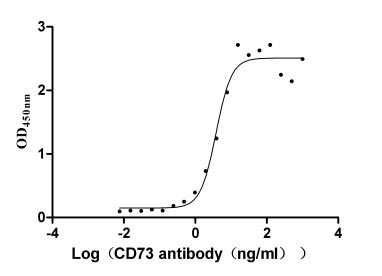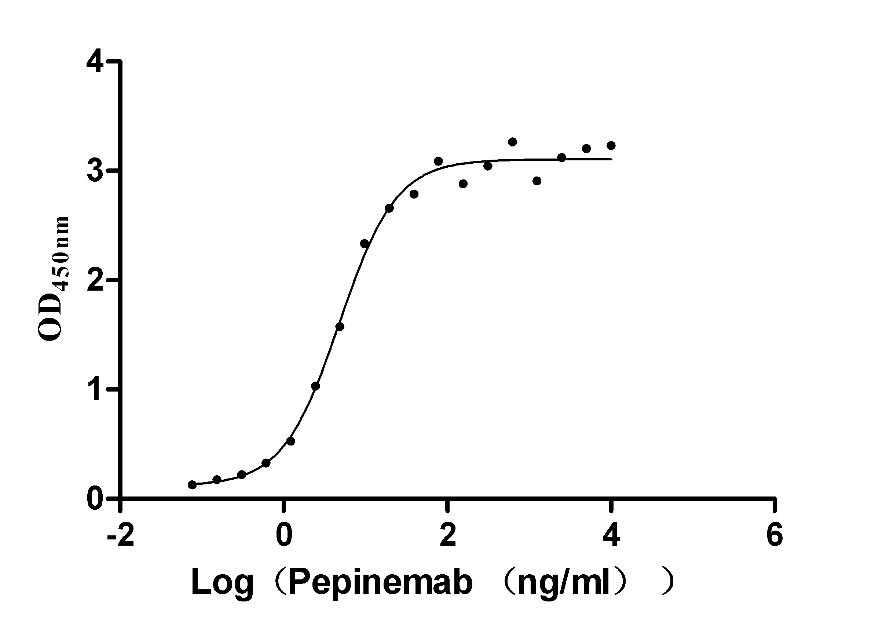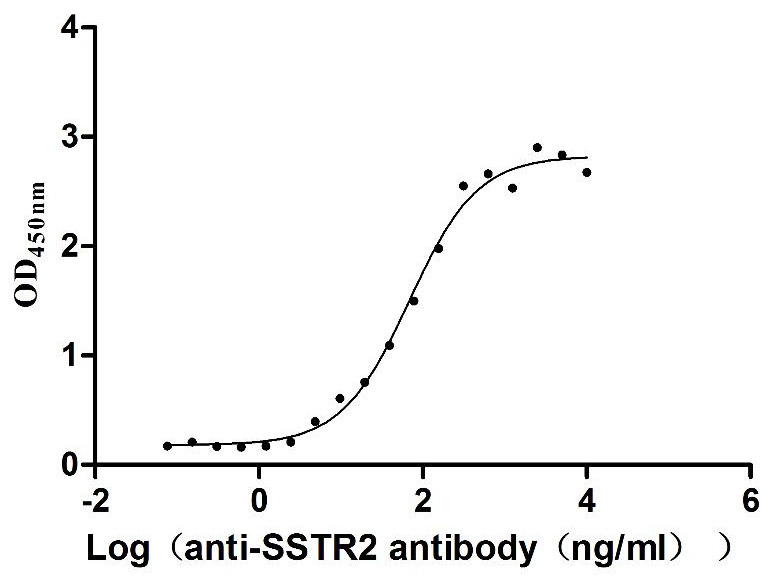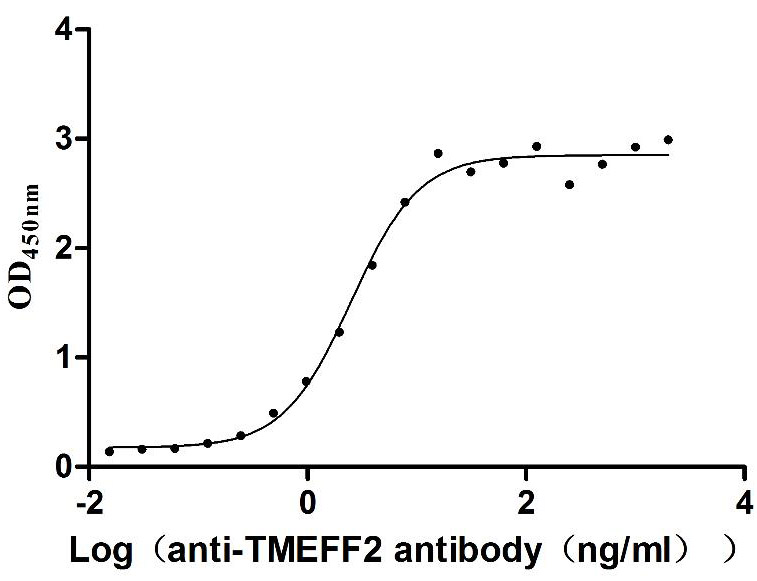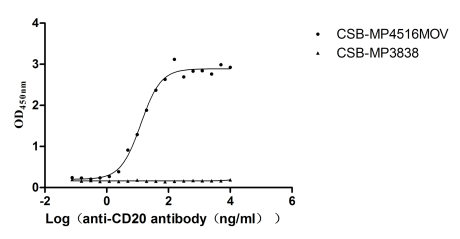Recombinant Human Eukaryotic elongation factor 2 kinase (EEF2K)
-
货号:CSB-YP007435HU
-
规格:
-
来源:Yeast
-
其他:
-
货号:CSB-EP007435HU
-
规格:
-
来源:E.coli
-
其他:
-
货号:CSB-EP007435HU-B
-
规格:
-
来源:E.coli
-
共轭:Avi-tag Biotinylated
E. coli biotin ligase (BirA) is highly specific in covalently attaching biotin to the 15 amino acid AviTag peptide. This recombinant protein was biotinylated in vivo by AviTag-BirA technology, which method is BriA catalyzes amide linkage between the biotin and the specific lysine of the AviTag.
-
其他:
-
货号:CSB-BP007435HU
-
规格:
-
来源:Baculovirus
-
其他:
-
货号:CSB-MP007435HU
-
规格:
-
来源:Mammalian cell
-
其他:
产品详情
-
纯度:>85% (SDS-PAGE)
-
基因名:EEF2K
-
Uniprot No.:
-
别名:C86191; Calcium/calmodulin dependent eukaryotic elongation factor 2; Calcium/calmodulin dependent eukaryotic elongation factor 2 kinase; Calcium/calmodulin-dependent eukaryotic elongation factor 2 kinase; Calmodulin dependent protein kinase III; cb365; EC 2.7.11.20; eEF 2 kinase; eEF 2K ; eEF-2 kinase; eEF-2K; Eef2k; EEF2K protein; EF2K_HUMAN; Elongation factor 2 kinase; Eukaryotic elongation factor 2 kinase; fa04b08; HSU93850; kinase eEF2K; MGC45041; SMEF2K; wu:fa04b08; zgc:100973
-
种属:Homo sapiens (Human)
-
蛋白长度:full length protein
-
表达区域:1-725
-
氨基酸序列MADEDLIFRL EGVDGGQSPR AGHDGDSDGD SDDEEGYFIC PITDDPSSNQ NVNSKVNKYY SNLTKSERYS SSGSPANSFH FKEAWKHAIQ KAKHMPDPWA EFHLEDIATE RATRHRYNAV TGEWLDDEVL IKMASQPFGR GAMRECFRTK KLSNFLHAQQ WKGASNYVAK RYIEPVDRDV YFEDVRLQME AKLWGEEYNR HKPPKQVDIM QMCIIELKDR PGKPLFHLEH YIEGKYIKYN SNSGFVRDDN IRLTPQAFSH FTFERSGHQL IVVDIQGVGD LYTDPQIHTE TGTDFGDGNL GVRGMALFFY SHACNRICES MGLAPFDLSP RERDAVNQNT KLLQSAKTIL RGTEEKCGSP QVRTLSGSRP PLLRPLSENS GDENMSDVTF DSLPSSPSSA TPHSQKLDHL HWPVFSDLDN MASRDHDHLD NHRESENSGD SGYPSEKRGE LDDPEPREHG HSYSNRKYES DEDSLGSSGR VCVEKWNLLN SSRLHLPRAS AVALEVQRLN ALDLEKKIGK SILGKVHLAM VRYHEGGRFC EKGEEWDQES AVFHLEHAAN LGELEAIVGL GLMYSQLPHH ILADVSLKET EENKTKGFDY LLKAAEAGDR QSMILVARAF DSGQNLSPDR CQDWLEALHW YNTALEMTDC DEGGEYDGMQ DEPRYMMLAR EAEMLFTGGY GLEKDPQRSG DLYTQAAEAA MEAMKGRLAN QYYQKAEEAW AQMEE
-
蛋白标签:Tag type will be determined during the manufacturing process.
The tag type will be determined during production process. If you have specified tag type, please tell us and we will develop the specified tag preferentially. -
产品提供形式:Lyophilized powder
Note: We will preferentially ship the format that we have in stock, however, if you have any special requirement for the format, please remark your requirement when placing the order, we will prepare according to your demand. -
复溶:We recommend that this vial be briefly centrifuged prior to opening to bring the contents to the bottom. Please reconstitute protein in deionized sterile water to a concentration of 0.1-1.0 mg/mL.We recommend to add 5-50% of glycerol (final concentration) and aliquot for long-term storage at -20℃/-80℃. Our default final concentration of glycerol is 50%. Customers could use it as reference.
-
储存条件:Store at -20°C/-80°C upon receipt, aliquoting is necessary for mutiple use. Avoid repeated freeze-thaw cycles.
-
保质期:The shelf life is related to many factors, storage state, buffer ingredients, storage temperature and the stability of the protein itself.
Generally, the shelf life of liquid form is 6 months at -20°C/-80°C. The shelf life of lyophilized form is 12 months at -20°C/-80°C. -
货期:Delivery time may differ from different purchasing way or location, please kindly consult your local distributors for specific delivery time.Note: All of our proteins are default shipped with normal blue ice packs, if you request to ship with dry ice, please communicate with us in advance and extra fees will be charged.
-
注意事项:Repeated freezing and thawing is not recommended. Store working aliquots at 4°C for up to one week.
-
Datasheet :Please contact us to get it.
相关产品
靶点详情
-
功能:Threonine kinase that regulates protein synthesis by controlling the rate of peptide chain elongation. Upon activation by a variety of upstream kinases including AMPK or TRPM7, phosphorylates the elongation factor EEF2 at a single site, renders it unable to bind ribosomes and thus inactive. In turn, the rate of protein synthesis is reduced.
-
基因功能参考文献:
- that eukaryotic elongation factor 2 kinase might inhibit TGF-beta1-induced normal lung fibroblast (NHLF) proliferation and differentiation and activate NHLF cell apoptosis and autophagy through p38 MAPK signaling PMID: 29355493
- Our study provides first evidence that TQ treatment inhibits cell proliferation, migration/invasion, and tumor growth, in part through the inhibition of eEF-2K signaling in Triple-negative breast cancer (TNBC) . Thus, our findings suggest that systemic TQ treatment may be used as a targeted therapeutic strategy for the inhibition of eEF-2K in TNBC tumor growth and progression. PMID: 29971628
- The mechanism for Fluoxetine-induced autophagic cell death was associated with inhibition of eEF2K and activation of AMPK-mTOR-ULK complex axis. PMID: 29094413
- This study provides new insights into the control of eEF2K by AMPK. PMID: 28502587
- Data suggest forkhead box M1 (FOXM1)/eukaryotic elongation factor 2 kinase (eEF2K) axis as a molecular target in breast and other cancers. PMID: 26918606
- These new substrates suggest that eEF2K has a more diverse role in regulating cellular energy usage that involves multiple pathways and regulatory feedback. PMID: 27760376
- Myostatin inhibits eEF2K-eEF2 by regulating AMPK to suppress protein synthesis. PMID: 29024627
- The structural basis for the recognition of EEF2K by calmodulin has been presented. PMID: 27499441
- eEF2K activity is increased in postmortem Alzheimer's disease (AD) patient cortex and hippocampus, and in the hippocampus of aged transgenic AD mice. eEF2K inhibition using pharmacological or genetic approaches prevented the toxic effects of Abeta42 oligomers on neuronal viability and dendrite formation in vitro. Findings highlight the potential utility of eEF2K inhibition to reduce Abeta-mediated oxidative stress in AD. PMID: 27752775
- Results demonstrated that the promotive effect of eEF-2K on glycolysis resulted from the kinase-mediated restriction of synthesis of the protein phosphatase 2A-A (PP2A-A). PMID: 27181208
- This study reports how phosphorylation of a regulatory site (Ser-500) integrates with Ca(2+) and CaM to influence eEF-2K activity. PMID: 27956550
- Article reviews recent evidence concerning the role of eEF2K in human diseases; growing evidence links eEF2K to a range of human diseases, including cardiovascular conditions (atherosclerosis, via macrophage survival) and pulmonary arterial hypertension, as well as solid tumors, where eEF2K appears to play contrasting roles depending on tumor type and stage. eEF2K is also involved in neurological disorders. [Review] PMID: 26806303
- Recent evidence shows that eEF2K plays an important role in learning and memory, processes that require the synthesis of new proteins and involve Ca-mediated signalling. eEF2K is activated under conditions of nutrient and energy depletion PMID: 26009171
- Results show that eEF2K is rapidly activated in response to acidosis in cells, an effect that is followed by its downregulation. PMID: 25776553
- silencing of EEF2K promotes autophagic survival via activation of the AMPK-ULK1 pathway in colon cancer cells PMID: 24955726
- Deletion of Pten and p53 in mammary epithelium accelerates triple-negative breast cancer with dependency on eEF2K activity. PMID: 25330770
- Data show that eEF2K is activated during hypoxia or upon inhibition of prolyl hydroxylases and inhibited by its hydroxylation on a highly conserved proline residue, restricting its activity during normoxia. PMID: 25755286
- our results show, for the first time, that eEF-2K is involved in regulation of the invasive phenotype of PaCa cells through promoting a new signalling pathway, which is mediated by TG2/b1 integrin/Src/uPAR/MMP-2 PMID: 25215932
- data suggest that achieving an active conformation, rather than eEF2K activity per se, is required for its susceptibility to degradation. PMID: 25670349
- data show that the major trigger for activation of eEF2K upon mild cooling is the release of Ca2+ ions from the endoplasmic reticulum (ER) PMID: 25353634
- mTORC1 pathway and the oncogenic Ras/Raf/MEK/extracellular signal-regulated kinase (ERK) pathway cooperate to restrict eEF2K activity. PMID: 25182533
- eEF-2K activation appears to be analogous to an amplifier, where output volume may be controlled by either toggling the power switch or altering the volume control PMID: 25012662
- The roles of specific residues, selected on the basis of structural data for MHCK A and TRPM7, in the function of eEF2K, is studied. PMID: 24732796
- down-regulation of eEF-2K leads to induction of intrinsic, extrinsic as well as AIF-dependent apoptosis. PMID: 24193916
- Eukaryotic elongation factor 2 kinase regulates the development of hypertension through oxidative stress-dependent vascular inflammation. PMID: 23812389
- Data highlight a conserved role for eEF2K in protecting cells from nutrient deprivation and in conferring tumor cell adaptation to metabolic stress. PMID: 23706743
- the disruption of eEF-2K expression in breast cancer cells results in the down-regulation of signaling pathways affecting growth, survival and resistance and has potential as a therapeutic approach for the treatment of breast cancer. PMID: 22911754
- EEF2 phosphorylation by cyclin A-cyclin-dependent kinase 2 (CDK2) on a novel site, serine 595 (S595), directly regulates T56 phosphorylation by eEF2K. PMID: 23184662
- eEF-2 kinase fills critical niches in the life of a cancer cell and the eEF-2/eEF-2 kinase pathway is a key biochemical sensor. PMID: 22932089
- Burn induces prolonged activation of eEF2K and eEF2 in pediatric patients. PMID: 22269896
- These data indicate that eEF-2K is regulated at multiple levels with phosphorylation playing a critical role in the enzyme's turnover under stressful conditions. PMID: 22749997
- several autophosphorylation sites, including Thr(348), Thr(353), Ser(366) and Ser(445), all of which are highly conserved among vertebrate PMID: 22216903
- Phosphorylation of Ser-500 lags behind the phosphorylation of Thr-348 and is associated with the Ca(2+)-independent activity of eEF-2K(eEF-2K) PMID: 22329831
- highly conserved residues in the C-terminal tip of eEF2K are essential for the phosphorylation of eEF2 PMID: 22115317
- results suggest that the expression of eEF-2 kinase contributes to migration and invasion of human glioma cells by protecting them from anoikis. PMID: 21278783
- activation of eEF-2 kinase-mediated autophagy plays a protective role for cancer cells under metabolic stress conditions PMID: 20300520
- our results suggest that anisomycin or TNF-alpha inhibit eEF2 kinase via the phosphorylation of Ser-359. PMID: 12171600
- AMPK and eEF2 kinase may provide a key link between cellular energy status and the inhibition of protein synthesis, a major consumer of metabolic energy PMID: 14709557
- Results show that eukaryotic elongation factor 2 kinase is a target for mTOR signaling independently of previously known downstream components of the pathway. PMID: 15024086
- Levels of p-eEF2K were significantly increased, and total eEF2 significantly decreased in Alzheimer disease PMID: 16098202
- These results suggest that eEF-2 kinase plays a regulatory role in the autophagic process in tumor cells and may promote cancer cell survival under conditions of nutrient deprivation. PMID: 16921268
- These data closely match the control of Ser359 phosphorylation and indicate that cdc2 may be regulated by mTORC1. PMID: 18337751
- The target cells (HGC-27) expressed EF-2K and MHC-class I together with costimulatory molecules from heat stress. This antigen specific immune mechanism could have a prominent role in the pathogenesis of gastric ulcer. PMID: 19636416
显示更多
收起更多
-
蛋白家族:Protein kinase superfamily, Alpha-type protein kinase family
-
数据库链接:
HGNC: 24615
OMIM: 606968
KEGG: hsa:101930123
STRING: 9606.ENSP00000263026
UniGene: Hs.498892
Most popular with customers
-
Recombinant Human 5'-nucleotidase (NT5E) (Active)
Express system: Mammalian cell
Species: Homo sapiens (Human)
-
Recombinant Human Semaphorin-4D (SEMA4D), partial (Active)
Express system: Mammalian cell
Species: Homo sapiens (Human)
-
Recombinant Human Somatostatin receptor type 2 (SSTR2)-VLPs (Active)
Express system: Mammalian cell
Species: Homo sapiens (Human)
-
Recombinant Human Zymogen granule protein 16 homolog B (ZG16B) (Active)
Express system: Mammalian cell
Species: Homo sapiens (Human)
-
Recombinant Human Tomoregulin-2 (TMEFF2), partial (Active)
Express system: Mammalian cell
Species: Homo sapiens (Human)
-
Recombinant Macaca fascicularis Membrane spanning 4-domains A1 (MS4A1)-VLPs (Active)
Express system: Mammalian cell
Species: Macaca fascicularis (Crab-eating macaque) (Cynomolgus monkey)
-
Recombinant Human Interleukin-2 (IL2) (Active)
Express system: Mammalian cell
Species: Homo sapiens (Human)
-
Recombinant Human Myosin regulatory light chain 12A (MYL12A) (Active)
Express system: E.coli
Species: Homo sapiens (Human)


